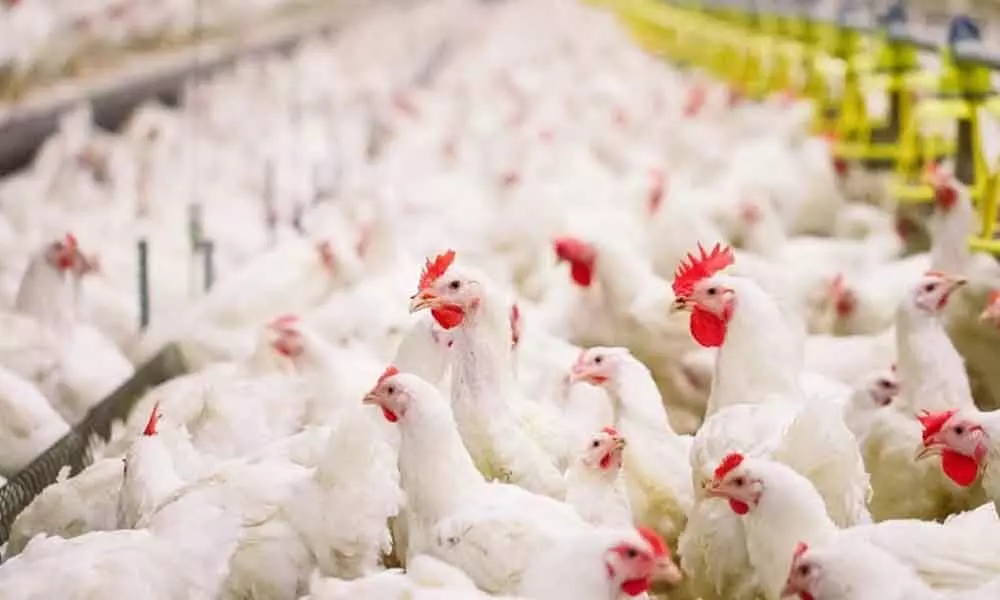Live
- Rajasthan bypolls: A tough contest between BJP and Congress
- Albania joins SEPA, paving way for EU integration
- Japanese government approves 250-billion USD economic package to ease price pain
- Six pharma companies to set up their units in Telangana
- The Unstable Events of a 17-Wicket Day in Perth: India vs Australia
- Dutch FM's Israel trip cancelled after Netanyahu's arrest warrant
- UK to increase energy price cap by 1.2 per cent
- Ethiopia launches national coffee platform to maximise earnings
- Centre completes auction of 3 coal blocks, to yield annual revenue of Rs 2,710 crore
- Ullal Woman Files Complaint Against Husband Over Instant Talaq and Abuse
Just In

Hub of agri, aqua-based industries
With vast rich delta land, 111-kilometre coastline and situated in the heart of the State, Krishna district is well known for the poultry industry, aqua cultivation and automobile industrial units
Vijayawada: With vast rich delta land, 111-kilometre coastline and situated in the heart of the State, Krishna district is well known for the poultry industry, aqua cultivation and automobile industrial units.
The rich Krishna delta helps cultivation of agriculture and horticulture crops that promote agro-based industries and food processing units. Poultry is one of the most important industries in the district with a poultry population of 157,83,526. Chicken and eggs are exported to West Bengal, Odisha, Assam, Bihar and other States from Krishna district. The poultry industry provides livelihood to several thousand farmers. Fish and prawn cultivation is one of the important sources of livelihood in the district.
Krishna district stood first in aqua cultivation in the State with fish and prawns cultivated in nearly 70,000 hectares mainly in the eastern parts. It has won the national award in 2019 as one of the top three districts in the country in aqua cultivation. Prawn and fish feed manufacturing units are providing livelihood to several thousand workers.
Automobile industries
The district is also known for automobile units. The Jawahar Industrial Autonagar in Vijayawada is famous for body-building units. Buses, trucks and containers are built by expert technicians in the autonagar. Transport operators from across the State come to Jawahar Autonagar for building bodies of vehicles.
Four cement factories operate in Jaggaiahpet, while the western Krishna region is home to stone-crushing units. With rich delta area, the district also has hundreds of rice mills. Dairy units also provide livelihood to a large number of farmers.
Krishna district is the transport hub of Andhra Pradesh with 25,000 trucks operating from here. Being centrally located in the State and connecting point between north and south coastal districts, transportation plays a key role in transportation of agriculture and horticulture products.
According to the district industries department, the district has 6,582 micro, small and medium industries with an investment of Rs 2,320 crore and providing livelihood to nearly 70,000 people. As many as 73 heavy and large industries in the district with investment of Rs 14,658 crore are providing livelihood to nearly 30,000.
Dairy units, palm oil units, garment units, sponge iron units, fabrication units and metal industries are located in autonagars and other areas in the district. Andhra Pradesh Industrial Infrastructure Development Corporation (APIIC) has developed industrial estates and autonagars in Vijayawada, Gudivada, Machilipatnam, Jaggaiahpet, Nuzvid, Mallavalli in Bapulapadu mandal and Veerapaneni Gudem in Gannavaram mandal, said V Murali Krishna, Zonal Manager, APIIC, Vijayawada. He said Ashok Leyland unit in Mallavalli industrial park was set up in 75 acres and an industrial park in Veerapaneni Gudem, Gannavaram mandal, was set up in 86 acres.
Krishna district has excellent road and rail connectivity. Vijayawada is one of the important railway junctions in South India. There is rail connectivity from Vijayawada to all parts of the country.
Two national highways, Chennai-Kolkata, Machilipatnam-Hyderabad highways pass via Vijayawada. Gannavaram airport also launched cargo services to various destinations in the country. HPCL, IOC refilling units in Kondapalli industrial area and Bharat Electronics Limited in Machilipatnam are major industries in the district.
Krishna district has the potential for promotion of food processing units, owing to the existence of aqua farms, abundant production of mangoes, guava and other fruits. However, people are not habituated to taking processed food, said Potluri Bhaskara Rao, General Secretary, Andhra Pradesh Chamber of Commerce and Industry.
He said food processing units in the district are struggling for survival due to high cost of power charges, increasing diesel prices, labour charges and other maintenance expenses.

© 2024 Hyderabad Media House Limited/The Hans India. All rights reserved. Powered by hocalwire.com







